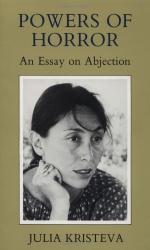
|
| Name: _________________________ | Period: ___________________ |
This test consists of 5 multiple choice questions, 5 short answer questions, and 10 short essay questions.
Multiple Choice Questions
1. Freud believed his Oedipus complex produces a kind of mental archetype for what?
(a) All hatred.
(b) All repression.
(c) All repulsion.
(d) All desire.
2. What does Kristeva says is the only way man can express the abject?
(a) Through religion.
(b) Language.
(c) Song.
(d) Art.
3. Who does Kristeva say is not directly involved when a child is weaned from his mother's breast?
(a) A doctor.
(b) The mother.
(c) A psychiatrist.
(d) The father.
4. Kristeva says that Jewish laws are a result of the combination of psychological forces and what aspect of the Jewish religion?
(a) The belief in the coming of the Messiah.
(b) The monotheistic nature.
(c) The belief in prophets.
(d) The belief in the Torah.
5. Kristeva says that the ritualization of defilement and purification is also responsible for creating inequality between whom?
(a) The sexes.
(b) Religions.
(c) Races.
(d) Classes.
Short Answer Questions
1. According to Jewish rituals, a newborn boy is considered pure on what condition?
2. What book of the Bible addresses rules around eating meat?
3. Insofar as the repressed desires are related to the proper use of one's body, Kristeva says the body becomes an object of what?
4. Kristeva says that the Christian account of sin could be defined as what?
5. The Oedipus complex assumes that the child's first object of desire is what?
Short Essay Questions
1. What does Kristeva say about how the New Testament contradicts the traditional Christian thoughts about the origin of sin?
2. According to class theory, how are the drives of an individual divided?
3. What does Kristeva mean when she talks about "subjectified abjection"?
4. What are the two stages in which Kristeva says the quest for the "Other" breaks down?
5. According to traditional beliefs in Christianity, how does Adam's original sin taint human freedoms?
6. How does Kristeva say Christianity and Judaism differ in the thoughts of impurity?
7. How does Kristeva say the impurity phobia serves as a metaphor for society?
8. How does Kristeva explain phobias?
9. What rules come with the permission to eat meat in the Old Testament?
10. What does Kristeva say happens when one stops trying to seek out the "Other"?
|
This section contains 823 words (approx. 3 pages at 300 words per page) |

|




